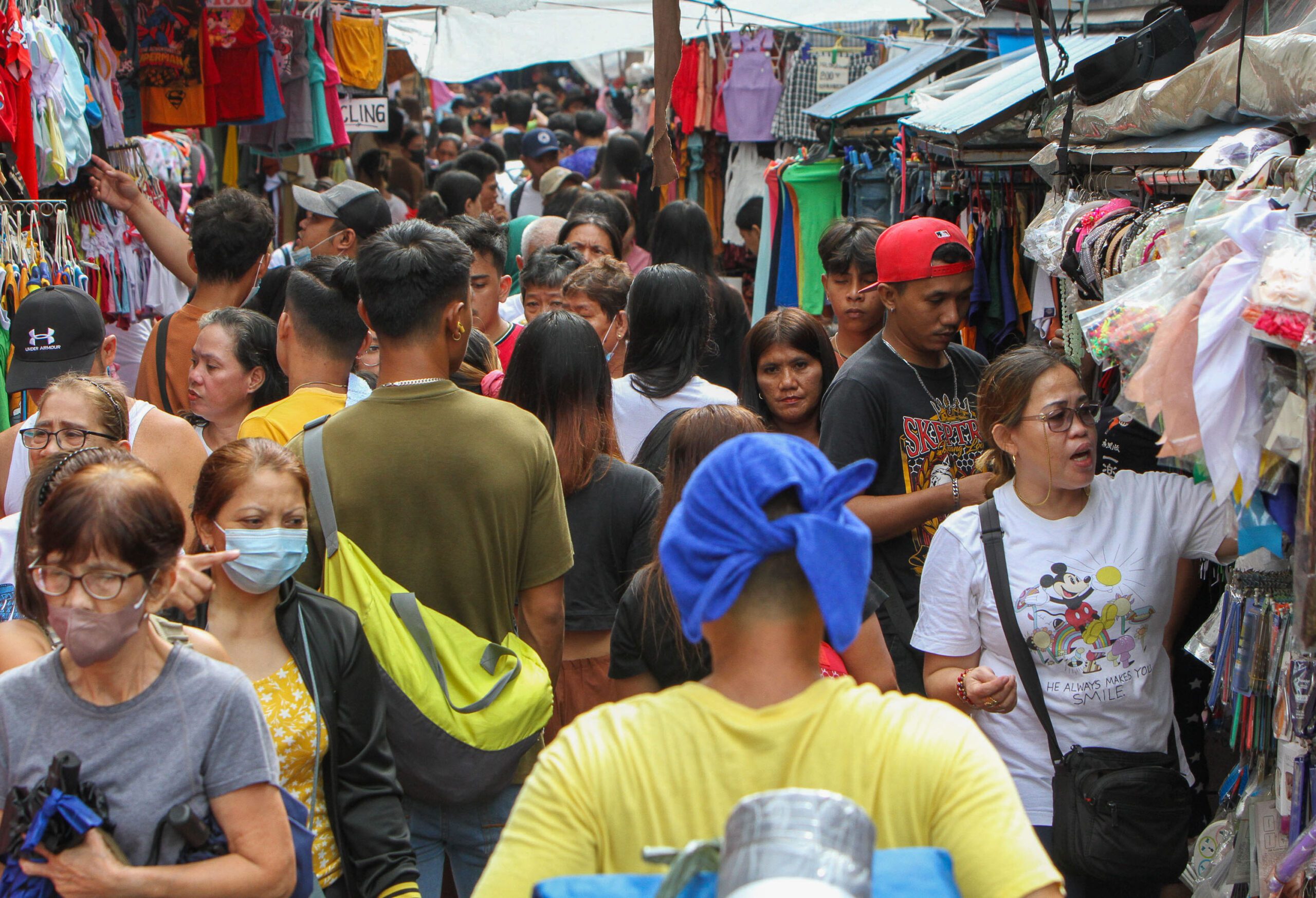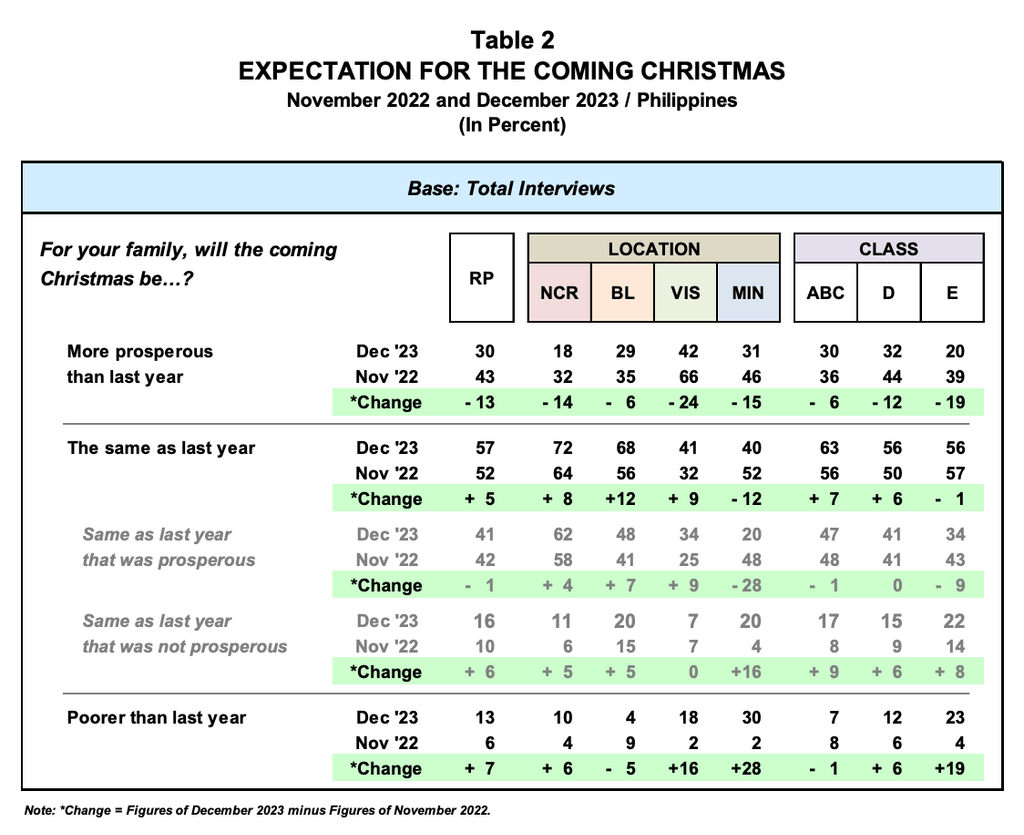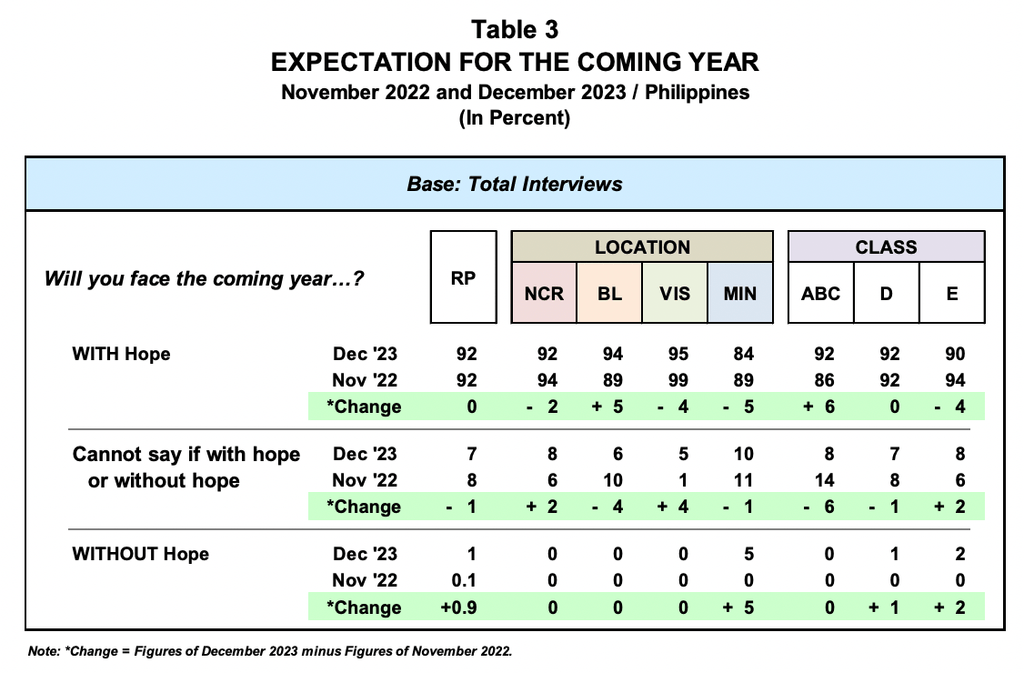SUMMARY
This is AI generated summarization, which may have errors. For context, always refer to the full article.

MANILA, Philippines – Pulse Asia’s recent nationwide survey on the Holiday season puts a spotlight on a curious reality: the Filipino propensity for hope, even in challenging circumstances.
According to the survey, conducted from December 3 to 7, 2023, 92% of the 1,200 respondents said they are facing the new year “with hope” – a number unchanged from the same survey held almost a year prior in November 2022.
“Amidst the various challenges Filipinos face on a daily basis, most of them continue to remain optimistic, with 92% saying they will face the new year with hope,” said Pulse Asia.
The sentiment is shared across geographic areas and socio-economic groups. According to the survey, only 1% of respondents said they face 2024 without hope, while 7% were ambivalent, or said they couldn’t say if they were facing 2024 with or without hope.
Curiously enough, only 30% from the same set of respondents in the survey said their family would be “more prosperous” this Christmas, a 13-percentage point decrease from the November 2022 survey.
A plurality of respondents said Christmas in 2023 would be “same as last year” in terms of prosperity – 41% percent said their family’s prosperity would be as prosperous as 2022, while 16% said Christmas 2023 would be as “not prosperous” as it was the year prior.

On the question of family prosperity compared to last year, numbers dipped most dramatically for Class D and E, and for respondents in Visayas, Mindanao, and Metro Manila.
In the Visayas, 42% said they expected a “more prosperous” Christmas in 2023, down 24-percentage points from the November 2022 survey. In Mindanao, the drop was 15-percentage points (from 46% to 31%) and in Metro Manila, the drop was 14-percentage points (from 32% to 18%).
Only 20% of Class E respondents saw a “more prosperous” Christmas 2023, a 19 percentage point drop from 2022. Only 32% of Class D respondents said they expected a “more prosperous” Christmas in 2023, a 12 percentage point drop from the year prior.

Hope and prosperity?
“We have always seen this level of hopefulness about the coming year. Shows that Filipinos are optimistic,” explained Pulse Asia President Ronald Holmes in a message to Rappler.
But what does hope mean? We asked Rappler columnist and resident sociologist Jayeel Cornelio for more clarity.
“The devil is in the details,” pointed out Cornelio.
If you put together those who said Christmas 2023 would be “more prosperous” than 2022 (30%) and those who said it would be just as prosperous as the year prior (41%), it would total 71% of respondents.
“So that’s 71% of the population who are okay, and they may account for the high hopes for 2024,” he said.
In 2022, 85% of the respondents said their 2022 Christmas would be more prosperous (43%) or just as prosperous (42%) as the prior year
“Another reason is this: hope is not always tied to prosperity. Filipinos have been consistently hopeful, but what that means might vary from person to person,” he added.
That we can be so hopeful is difficult to question. “It’s a Filipino sensibility though, possibly because of our religious upbringing,” added Cornelio.
A 2022 column Cornelio wrote for Rappler also challenges the presumption that an abundance of hope is always a good thing: “It’s one thing to celebrate hope. But it’s quite another to question the conditions that leave us always hoping. It is for this reason that we need to have an honest conversation about hope and its limits.”
“Given the inequality in this country, there’s not much worth celebrating whenever we say we are a hopeful people. On the contrary, hope is a symptom of systemic problems that have left so many desiring of the benefits of progress that only few of us get to enjoy,” Cornelio wrote in a December 2022 opinion piece titled “A sociology of hope.”
According to a Social Weather Stations survey taken from end-September to October 2023, over 48% of Filipino families described themselves as “mahirap” or poor, while 27% said they were borderline poor. Only 25% of those surveyed considered themselves “hindi mahirap” or not poor.
“In this discourse, Filipinos must endure their circumstances in the hope that tomorrow our dreams will be fulfilled. Deployed in this manner, hope lays the burden for progress on individuals. But conveniently, it deflects responsibility away from the state over its misplaced priorities, corruption, and inefficiency,” said Cornelio in his 2022 piece.
Thinking about the numbers for end-2023 and the upcoming year, Cornelio said: “So, hope is a double-edged sword for Filipinos, I think. It’s optimistic but implicitly fatalistic.”
SWS: 73% of Filipinos expect happy Christmas
In relation to a hopeful population, a Social Weather Stations (SWS) survey conducted from December 8 to 11 showed that a big majority of Filipinos, or 73% of respondents, are expecting a happy Christmas this 2023.
The number is 23 points above the record-low of 50% back in 2020, when Filipinos were adjusting to the new normal under the COVID-19 lockdown.
The survey found that only 6% of adult Filipinos are expecting Christmas to be sad, while 21% are ambivalent.
In a country that celebrates the longest Christmas season in the world, SWS noted that adults expecting a sad Christmas customarily only hit single-digit levels.
The expectation for a happy Christmas does not change that much across geographical areas. For example, those from the Visayas who expect a merry Christmas were at 78% – unchanged from last year. Those in Metro Manila were at 72%, statistically unchanged from last year’s 71%.
As the year ends, Filipinos are most thankful for good health, family, and being alive, according to the SWS survey results.
Aside from these three things, Filipinos are also grateful for career, food on the table, daily survival, blessings, prosperity, education, safety, and God. – Rappler.com
Add a comment
How does this make you feel?
![[OPINION] A sociology of hope](https://www.rappler.com/tachyon/2022/12/Hope-Sociology.jpg?fit=449%2C449)


![[EDITORIAL] Kapag bumabagsak ang ratings, balikan ang basics](https://www.rappler.com/tachyon/2024/04/animated-bongbong-marcos-sara-duterte-popularity-numbers-2024-carousel.jpg?resize=257%2C257&crop_strategy=attention)
![[OPINION] Can Marcos survive a voters’ revolt in 2025?](https://www.rappler.com/tachyon/2024/04/tl-voters-revolt-04042024.jpg?resize=257%2C257&crop=251px%2C0px%2C720px%2C720px)
![[In This Economy] Economic charter change is very unpopular – it’s time lawmakers listened](https://www.rappler.com/tachyon/2024/04/in-this-economy-charterchange.jpg?resize=257%2C257&crop=292px%2C0px%2C720px%2C720px)
There are no comments yet. Add your comment to start the conversation.